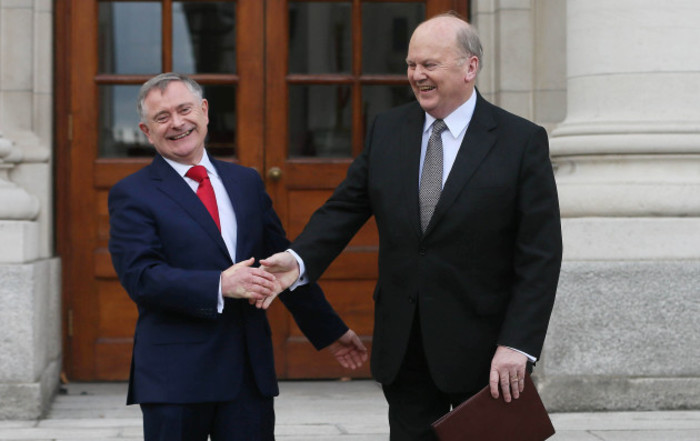'The Budget is an exercise in wasted energy and perpetuating short-termism'
Don’t expect anything that helps build on a long-term vision for Ireland.
THIS TIME EVERY year in Ireland, the focus moves to the Budget announcement.
We are forced to suffer through weeks of media speculation on hypothetical scenarios, biased rhetoric from the various lobby groups and a fresh dose of political jostling to influence voters.
In my mind, the attention paid to the annual Budget is an exercise in wasted energy and a perpetuation of the short-termism that drives the behaviour of stakeholders in the economy.
For all the fanfare leading up to the day, the decisions announced every year are typically at the margins. Do not expect any groundbreaking announcements in terms of setting a long-term vision for Irish society.
You might say that those long-term plans are for a discussion another day, but I think the time spent on influencing and developing the Budget would be better spent on working towards a goal for the Ireland we want to build.
The failure of the previous Fine Gael/Labour government to be re-elected despite the strong headline economic numbers was a reminder that not everyone has benefited in the economic recovery.
There is broad agreement that inequality has only increased since the global financial crisis, a by-product of the policies of governments and the all-powerful central banks. In Ireland, the reality is that many people are struggling to make ends meet. However, those expecting the issue of inequality to be addressed in an annual Budget are sadly mistaken.
Of course, how to best foster equality and fairness in a world that is driven by self-interest is something we have yet to reach agreement on. The first step might be agreeing on what a fair and equal society actually looks like, a vision for Irish society that everyone can work towards.
A safety net
A starting point could be to enshrine a social safety net in our constitution, a minimum standard that every government, irrespective of what political parties are in power, must uphold. For example it might include:
1. Healthcare: Every Irish resident should have access to a high standard of healthcare in a timely manner, irrespective of financial circumstances.
2. Housing: No Irish resident should be left without a roof over their head. Homelessness should not exist.
3. Education: The cornerstone of a developing society, the right to a free education must be protected.
I recognise that there are complexities in the development of policy around these and other areas, but wouldn’t it be nice to at least be clear on what we really stand for as a country, something every political party has to be committed to.
Of course, talk of a minimum social safety net will have me painted as a communist or a socialist. In politics and economics there is an obsession with labels, socialist or capitalist, left-wing or right-wing, democrat or conservative and so on.
It’s rubbish. I do not fit in a box. All I am talking about is a vision of a better society, a minimum standard that all stakeholders must contribute to.
 Ministers Michael Noonan and Brendan Howlin before Budget 2015
Ministers Michael Noonan and Brendan Howlin before Budget 2015
No ruffled feathers
Domestically, a big issue is the same one that plagues all governments – their failure to efficiently allocate tax revenue for the provision of sustainable and high-standard public services. The predicament has been made worse by the bailout of the banks, the massive national debt now hampering any real material change in policy.
In general, the public service does not conjure images of efficiency, productivity or creativity. Anecdotally, we have all heard the stories from someone working in the public service. The key is don’t ruffle feathers.
It is not an environment for people who want to go above and beyond, where they can champion fresh ideas and progress based on ability. A change of culture will not be brought about by any decisions in the Budget.
In some ways, the country should be run more like a corporation, but for the benefit of all citizens and the sustainability of its resources. The government, and its various departments, are effectively the management of our corporation. They deserve no better treatment than anyone working in the private sector.
The notion of a job for life hardly inspires development and efficiency. Failure to meet agreed objectives should have the same repercussions as it would have in the private sector. Call me a free-market socialist if you want.
The bigger picture
Instead of being distracted by the noise generated by the Budget sideshow, people need to focus on the bigger picture.
For example, we have a looming pension crisis, but the elephant in the room is the gold-plated state pensions for the higher echelons of public office. Should former political leaders receive pensions of up to five times the average annual income in Ireland?
How can someone who served as attorney-general in 1984 and later worked at Goldman Sachs, a multi multi-millionaire, receive state pension benefits of over €50,000 per year? If we are going to talk about equality, it must start at the top.
At the same time, corporations, which have become much more powerful after decades of increased globalisation, must make a greater contribution to society. Corporate scandals are a by-product of an obsessively short-term business model that focuses purely on ‘maximising shareholder value’. It is time a new model is adopted that more explicitly considers all stakeholders, not just shareholders.
Labour deserves its fair share, something that has not happened over the last 30 years. Reflecting on the weakness in real wage growth since 1980, a recent Deutsche Bank research report on long-term trends noted:
“One might wonder why there hasn’t been more rebellion from workers against this trend until the recent rise in extremist parties around the globe”.
That is coming from an investment bank.
Personal responsibility
Let me be clear: I am not talking about building a handout society. Individuals must accept a greater personal responsibility, and too many people are falling short in terms of making a contribution to society.
If you are going to have kids look after them properly, care for them and stop making excuses. The government can play a bigger role in the provision of childcare services, but they can only do so much. Proper care starts at home.
The obesity crisis, which poses a massive economic burden on the country and an already broken healthcare system, can be solved if people take greater individual responsibility.
The more discerning people are in terms of judging corporations and their practices, who they buy goods and services from, the more corporations will be forced to adapt.
People need to take greater ownership in their communities. Why do areas become run down? It is because the majority of people have left it for someone else to look after. If everyone played their part it would not happen.
We talk about social housing and private housing. It should make no difference, the house should be treated with the same respect. The concept of ownership in our society needs to change.
I remember when I visited Japan last year I couldn’t believe how clean their cities were, even just a simple thing like how well they treated their bus shelters. There was no graffiti and the cushions were intact. It struck me that if it was Ireland, someone would have destroyed them. That is the problem.
People miss the fact that these little things are a representation of our society.
So, rather than wasting weeks and months on the noise around marginal decisions in the annual Budget, an outdated practice, let’s use the time as a platform for developing new ideas, polices of inclusion. A vision for Irish society we can all work towards, but a minimum standard we can never fall below.
Vincent McCarthy is head of investment consulting at Invesco.
If you want to share your opinion, advice or story, contact opinion@fora.ie.






